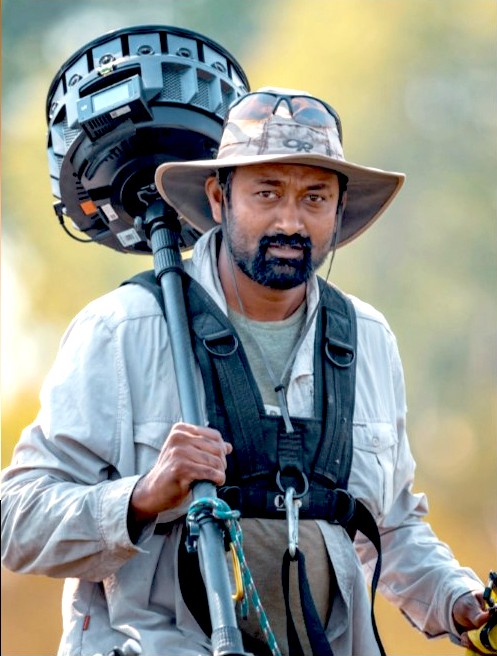Sandesh Kadur's summer project turned into three years of learning the craft of wildlife filmmaking.
Thursday, January 2, 2020
Alumni
By Maria Elena Hernandez

RIO GRANDE VALLEY, TEXAS – A last-minute change on a project turned into the start of an award-winning film career for Sandesh Kadur.
His work has been featured in film festivals around the world. He was named a National Geographic Emerging Explorer in 2013, and is now a BAFTA winner and Emmy-nominated cinematographer.
Before all that, though, he was a student at UTRGV legacy institution UT Brownsville/Texas Southmost College.
In 1996, Kadur had plans to intern on a film about the Western Ghats in India. However, the cinematographer who would lead the project was unable at the last minute to work on it.
“That's when (biology professor) Lawrence Lof, my mentor, called me and said, ‘Well, do you still want to make the film?’ And I was 20 years old,” Kadur said. “I said, ‘Yes, of course.’ He said, ‘OK, figure out what you need and go get it.’”
Lof charged a professional camera and lens to his credit card. The items arrived the day Kadur was leaving to start the film.
“With his support, I went back to India with a tripod and camera in hand. It was supposed to be a three-month college project, a summer project. It turned into three years of spending the time to learn the technology and learn the craft of wildlife filmmaking,” Kadur said.
POST-PRODUCTION & FILM FESTIVALS
When he returned to the university, members of the media services department taught him how to edit the film, and Dr. Juliet Garcia, then-president of UTB/TSC, narrated the film in one read-through.
“We had a great voice, a beautiful story, and it all blended nicely together,” Kadur said. “And that was my first documentary, called ‘Sahyadris: Mountains of the Monsoon.’”
The film went on to win accolades at several film festivals.
“It made such an impact on public impression of this important area that it began the movement to save this biodiverse area,” Lof said.
UNIQUE LEARNING OPPORTUNITIES
Kadur, who graduated from UTB-TSC in 2001 with a degree in biology, called his time in the Rio Grande Valley life changing.
“I was fortunate to come down to the Rio Grande Valley because this is one of the hot spots of biodiversity for the United States. It's a perfect place for any naturalist to get started,” Kadur said.
When he was a student, the Gorgas Science Society, a campus organization, immediately caught his attention. That led to mentors in the biology department, Lof and Guillermo Aguilar, as well as time at the Rancho del Cielo biology station in Mexico. At the time, the station offered classes in biology, English and art, along with research programs.
“I think it’s one of the most unique programs that any university could ever dream of having,” he said.
WORLDWIDE RECOGNITION
Since that first documentary, Kadur’s work has been featured on National Geographic, the BBC and Animal Planet.
Lof, now retired from teaching, said Kadur is at the top of his profession, working globally.
“He’s making his impact,” Lof said. “He works in Africa. He works in India. He’s working in South America.”
On occasion, the UTRGV legacy graduate returns to the Valley to make a presentation. Lof said they usually have just a few days of advance notice, but each time, Kadur draws a large turnout.
“We had close to 200 people at the educational building at Sabal Palm Sanctuary the last time he was here,” Lof said. “And then, the next night, they had almost a full house in Port Isabel. People know his work.”
While Kadur’s start in filmmaking was unexpected, he said, “I don't think people need to look at a career as a defined pathway.
“I believe there are opportunities out there for you to go and explore,” he said. “And if you are willing to persevere and have the patience, you can achieve what you're passionate about.”
ABOUT UTRGV
The University of Texas Rio Grande Valley (UTRGV) was created by the Texas Legislature in 2013 as the first major public university of the 21st century in Texas. This transformative initiative provided the opportunity to expand educational opportunities in the Rio Grande Valley, including a new School of Medicine and a School of Podiatry, and made it possible for residents of the region to benefit from the Permanent University Fund – a public endowment contributing support to the University of Texas System and other institutions.
UTRGV has campuses and off-campus research and teaching sites throughout the Rio Grande Valley including Brownsville (formerly The University of Texas at Brownsville campus), Edinburg (formerly The University of Texas-Pan American campus), Harlingen, Weslaco, McAllen, Port Isabel, Rio Grande City and South Padre Island. UTRGV, a comprehensive academic institution, enrolled its first class in the fall of 2015; the School of Medicine welcomed its first class in the summer of 2016, and the School of Podiatric Medicine in the fall of 2022.
